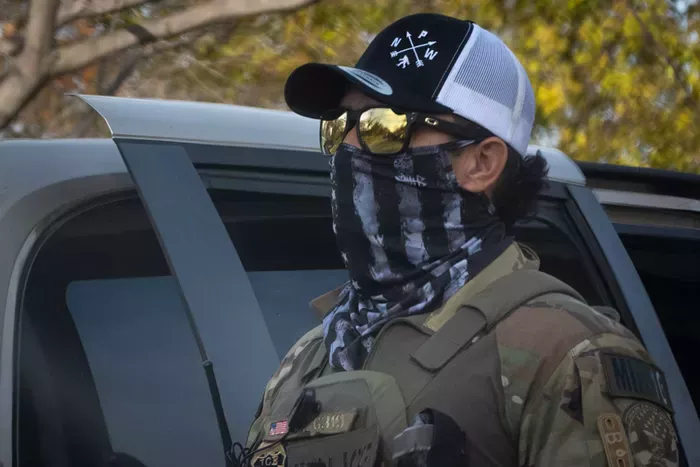This post was originally published on this site

Camille Baldwin-Bonney doesn’t buy it.
The police accountability advocate and co-chair of People Power Washington called Mayor Bruce Harrell’s new anti-ICE executive orders “performative rather than substantive”—a feel-good gesture from the same administration wiring CCTV surveillance cameras throughout the city that federal agents may be able to get their hands on, despite the council’s circuit breaker of a policy that shuts down the CCTVs if the feds subpoena.
In preparation, Mayor Bruce Harrell issued an executive order that instructed the Seattle Police Department (SPD) to write a “directive” for how officers should respond to ICE encounters, barring them from aiding federal agents.
“To then be saying, ‘Well, I’m standing up to ICE and federal agents,’—you’re handing them over tools,” Baldwin-Bonney said.
Her skepticism is grounded. ICE raids have ramped up nationwide. Agents are in Washington. In the first five months of Trump’s second term, ICE arrests surged 35 percent. More recently, ICE arrested two people in Issaquah late October, and several in Redmond earlier this month. And federal troops could occupy Seattle and Portland like they have Chicago and Washington DC.
On paper, the directive seems bold. In practice, it doesn’t ask for much. Harrell’s EO only requires SPD directive to state that officers and a supervisor respond to the scene, keep their body cameras on, try to verify that the federal agent really is a federal agent, and then write up a report. They’re essentially observers and walking cameras, acting as a tracking mechanism. They’re not required to help ICE, but they’re also unable to stop immigration arrests from happening.
The vagueness of that order is why Councilmember Alexis Mercedes Rinck proposed a Statement of Legislative Intent (SLI) to the 2026 budget. The SLI forces SPD to involve police accountability partners when drafting the directive, and explain how officers will be trained to handle ICE-related incidents, including what they’ll do if asked to assist in an arrest or witness potential federal misconduct. Councilmembers Rob Saka, Mark Solomon, Joy Hollingsworth, Maritza Rivera, Dan Strauss and Bob Kettle cosponsored.
“This SLI is intended to really push the department to develop clarity on…how they will be engaging in these situations,” Rinck said. “If a masked individual is zip-tying Seattle residents, how is SPD directing patrol and other officers to engage with that person, identify that person? How will they do that? When do they intervene?”
But what’s challenging for Rinck’s office, she said, is working within the limited power they have.
“We’re talking about a delicate dance between federal powers—which are more than a local jurisdiction’s—and our police department’s responsibility to protect our residents,” Rinck said.
It’s a tension that Harrell’s office acknowledged too. Senior Communications Advisor Karissa Braxton-Lytle said that while the executive orders can’t change the fact that federal law enforcement trumps local law enforcement, they can make sure SPD has “clear, transparent procedures in place when federal agents are present.”
Andrew Chan, an immigration lawyer with the civil rights and immigration firm MacDonald Hoague & Bayless, explained that under federal law, local police can’t obstruct federal agents from carrying out their duties, but they’re not obligated to help, either. Washington’s Keep Washington Working (KWW) Act reinforces that stance, prohibiting police from sharing non-public data with federal agents for immigration enforcement.
But KWW is loophole-y. If ICE, in any state, has a judicial warrant or labels an operation as a “criminal” arrest, the local police can be legally compelled to assist.
But wait, you might be thinking, isn’t the federal government saying all undocumented immigrants are criminals? What can be deemed “criminal” legally is more complicated. Being undocumented and in the United States—like overstaying a visa—is not a crime, it’s a civil infraction. However, unlawful entry—entering the United States by means other than through a designated port or evading inspection by immigration officers—is a misdemeanor, which is a crime. Chan said this is rarely prosecuted by federal prosecutors who “are dealing with much more serious crimes.” But it is where the feds may be able to sidestep KWW and enlist the cops to aid in immigration enforcement.
Even so, sometimes law enforcement ignores sanctuary laws. The Washington state attorney general sued the Adams County Sheriff’s Department in March for allegedly jailing people solely based on immigration status, in violation of KWW. And a 2021 Oregon Public Broadcasting report found that Clark County Jail had continually shared information with ICE in spite of the state’s sanctuary law. In Southern California, law enforcement agencies violated state law more than 100 times by sharing Automated License Plate Recognition (ALPR) data with federal agents.
“We’re kind of operating under the shroud of darkness,” Chan said. “We don’t know what they’re sharing or if they’re sharing.”
That said, federal agents are (supposedly) not above the law. Chan said that if ICE oversteps—like if they break into a workplace and detain people without warrants—they could, in theory, face charges. In California, former House Speaker Nancy Pelosi and San Francisco District Attorney Brooke Jenkins recently threatened to arrest federal agents breaking local or state laws. Oregon Democrats want local police to investigate federal agents who break state laws on excessive force and policing.
“If local police have probable cause that federal agents are breaking the law, then they can—and in my opinion, they should—charge those agents with breaking the law,” Chan said. “But federal agents have a lot of autonomy, and it would be a state-versus-federal battle royale.”
If the feds show up in Seattle, protests will follow. While Harrell insists SPD’s duty is to protect Seattle residents, not aid federal agents, federal and local law enforcement have worked in tandem during protest crackdowns, like during the 2020 Black Lives Matter protests. In those cases and others, SPD did not hesitate to meet demonstrators with violence.
Council’s SLI now presses SPD to clarify whether it will coordinate with the mayor’s and city attorney’s offices on legal countermeasures, fighting subpoenas, data grabs or coerced cooperation with ICE.
Newly elected City Attorney Erika Evans said defending immigrant communities from “draconian” federal overreach will be one of her foremost priorities when she takes office in January.
“As city attorney, I would work closely with city departments and SPD to ensure these protections are real and enforced,” Evans said. “If and when federal troops come to Seattle, you can be damn sure I will see them in court.”



















